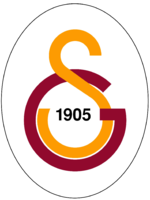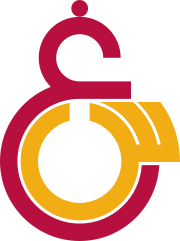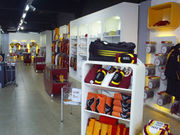Galatasaray S.K.
 |
|
| Full name | Galatasaray Spor Kulübü |
|---|---|
| Founded | 1 October 1905 |
| Nicknames | Cim bom Aslanlar (The Lions) Sarı-Kırmızılılar (Yellow-Reds) Avrupa Fatihi (Conqueror of Europe) Gala (Mostly used in Europe) |
| Club colors | red and yellow |
| Chairman | |
| Website | http://www.galatasaray.org/ |
Galatasaray Spor Kulübü (Turkish pronunciation: [ɡaɫatasaˈɾaj ˈspoɾ kulyˈby], Galatasaray Sports Club) is a Turkish sports club based in Istanbul, most notable for its football section, also known as Galatasaray S.K.. It also fields teams in Athletics, Basketball, Wheelchair basketball, Volleyball, Water polo, Swimming, Rowing, Sailing, Judo, Bridge, Equestrian and Superleague Formula Motorsports. Galatasaray Sports Club is one of the most important members of Galatasaray Community as Galatasaray University and Galatasaray Lisesi.
The football team is the most successful team in Turkey, holding a joint record number Turkish Super League and a record number Turkish Cup titles, Turkish Super Cups and TSYD Cups.[1][2] Galatasaray won the UEFA Cup and the UEFA Super Cup in 2000, and is the only Turkish football team to have won a major European trophy.
İhsan Emre Vural and his teammate Ahmet Yumrukaya became the first world-champions in the history of Turkey when they finished first in the 2004 Under 23 World Rowing Championships held in Poznań, Poland. The club's Wheelchair Basketball team won the Champions Cup in 2008 and 2009. They also won Kitakyushu Champions Cup and became world champion in 2008 and 2009.[3][4] Galatasaray women's basketball team won the FIBA Eurocup 2009.[5]
Contents |
The name
The name Galatasaray means Galata Palace, as Galatasaray Lisesi is located near Galata, the medieval Genoese citadel at the north of the Golden Horn, also known as Pera (Peran en Sykais). Since the 19th century, the name "Pera" refers to the larger borough of Beyoğlu which includes the Galata.[6]
History
| Active departments of Galatasaray | ||
|---|---|---|
| Football | Volleyball (Men's) | Volleyball (Women's) |
| Basketball (Men's) | Basketball (Women's) | Wheelchair Basketball |
| Athletics | Bridge | Equestrian |
| Judo | Rowing | Sailing |
| Swimming | Water Polo (Men's) | Water Polo (Women's) |
| SL Formula | ||
Galatasaray Sports Club was founded in the fall of 1905, by Galatasaray Lisesi (an elite high school founded in 1481) students as a football club. Galatasaray's first president was Ali Sami Yen. Their first match was against Cadi Keuy FRC and they won this match 2–0.[7] There were discussions about the clubs name, in which some suggested Gloria (victory) and others Audace (courage), but it was decided that its name would be Galatasaray.[8]
According to researcher Cem Atabeyoğlu, Galatasaray took its name from one of its first matches. In that match, Galatasaray won 2–0 over Rûm club and the spectators called them "Galata Sarayı Efendileri" (in English: Gentlemen of Galata (City) Palace), and, after this event, they adopted that name and started to call their club "GalataSaray". In 1905, during the era of the Ottoman Empire, there were no laws for associations so the club could not be registered officially, but, after the 1912 Law of Association, the club registered legally.[9]
| “ | Our aim is to play together, to have a color and a name and to beat the teams of outside of Turkey. | ” |
|
—Ali Sami Yen |
||
Among with the founder Ali Sami Yen, the co-founders were the ones who were keen to do this sport, such as Asim Tevfik Sonumut, Reşat Şirvani, Cevdet Kalpakçıoğlu, Abidin Daver and Kamil.
At first, the colors of the Galatasaray Sports Club were red and white. These are the colors in Turkish flag. However, Turkish Republic was not founded at that time. Therefore, this inspiration caused repressive administration of the day feel uncomfortable and the administration hounded the footballers. For this reason, the colors were changed to yellow and dark blue till 1907. In 1908, new colors were chosen as red and yellow. Ali Sami Yen stated, "We were imagining brightness of yellow - red fire over our team and thinking that it would carry us from one victory to another."[9]
While the football in Turkey began to fully develop, Galatasaray won ten more Istanbul League titles, six Sunday League titles and three Friday League titles until 1952. Upon recognition of professional football in 1952, the first professional but non-national league of Turkey, Istanbul Professional League played between 1952 and 1959. Galatasaray won three of these seven titles.
Türkiye Profesyonel 1. Ligi (Turkcell Super League today) formed in 1959. This is the top-flight professional league in Turkish nationwide football, and the most popular sporting competition in the country. Galatasaray joined all seasons and won 17 league titles since then.[10]
The Turkish Football Federation starts to organize "Turkish Cup" (today it is organized with the name Ziraat Turkish Cup) in the 1962–63 season for Turkish clubs to qualify for the UEFA competitions. This is the only national cup competition in Turkey. Galatasaray joined all seasons and won 14 trophies since then.[11]
Departments

| Sport | Teams |
|---|---|
| Football | Galatasaray A.Ş. |
| Volleyball | Galatasaray Medical Park (women's volleyball) |
| Volleyball | Galatasaray Men's Volleyball Team |
| Basketball | Galatasaray Café Crown |
| Basketball | Galatasaray Medical Park (women's basketball) |
| Wheelchair Basketball | Galatasaray Wheelchair Basketball Team |
| Athletics | Galatasaray Athletics |
| Bridge | Galatasaray Bridge |
| Equestrian | Galatasaray Equestrian |
| Judo | Galatasaray Judo |
| Rowing | Galatasaray Rowing |
| Sailing | Galatasaray Sailing |
| SL Formula | Galatasaray S.K. |
| Swimming | Galatasaray Swimming |
| Water Polo | Galatasaray Men's Water Polo Team |
| Water Polo | Galatasaray Women's Water Polo Team |
Stadium
Galatasaray played during its first years in different fields, since there were not any stadiums in Istanbul. In 1921, the first stadium, Taksim Stadium opened.[12] Galatasaray played there until 1940. When the historic Taksim Stadium was demolished, Galatasaray decided to build a large, modern stadium. Due to difficulties stemming from World War II, construction was delayed for over two decades. In this period, they played in İnönü Stadium.
On 20 December 1964, Ali Sami Yen Stadium opened.[13] It is named after the founder of the club, Ali Sami Yen. It is in the Mecidiyeköy quarter of the Şişli district at the center of the city. In 1964, the stadium had a capacity of over 35,000. Today, due to improvements in security and prohibition of standing spectators, it has an all-seater capacity of 24,990.[14]
After 2002, when Atatürk Olympic Stadium was built for Istanbul's Olympic Games bid, Galatasaray started to play European Cup matches there. The attendance record for a Turkish stadium was broken there, in aGalatasaray–Olympiacos match played in front of 79,414 spectators. But the Ali Sami Yen Stadium has historic importance for Galatasaray fans although it is smaller and older.[15]
The new Türk Telekom Arena stadium is set to open in October 2010 and will be the new home ground for Galatasaray S.K., replacing the old Ali Sami Yen Stadium. The new stadium will have a capacity of 52,695 seats.
Since 1998, after every goal scored by Galatasaray, the last part of the song I Will Survive by the Hermes House Band is played. Although the song is in English, the part used has no lyrics except "la la la la". This makes it easy for fans to participate.
In addition, before every game the Florida State Warchant is played accompanied by what the fans call a "scarf show" where fans display and wave their Galatasaray scarves.[16]
Other facilities
- Galatasaray Islet
- Galatasaray Museum
- Florya Metin Oktay Sports Complex and Training Center
- Abdi İpekçi Arena
- Galatasaray Beyoğlu Hasnun Galip Club Administrative Center
- Galatasaray Kalamış Sailing Facilities
- Galatasaray Küçükçekmece Rowing Center
- Galatasaray Nevzat Özgörkey Equestrian Facilities
- Galatasaray Olympic Aquatic Center
Club officials
- Board of Directors
| Position | Name |
|---|---|
| President | |
| Vice-President |
- Presidents
| From-to | Names |
|---|---|
| 1905–1918 | |
| 1990–1996 | |
| 1996–2001 | |
| 2001–2002 | |
| 2002–2008 | |
| 2008– |
Galatasaray Store
Galatasaray Store is the official store of Turkish club Galatasaray SK. They have stores around whole Turkey, Germany, Northern Cyprus.

The stores which are located in Turkey:
- İstanbul (25)
- Ankara (5)
- İzmir (2)
- Bursa
- Antalya (3)
- İzmit
- Kayseri
- Denizli
- Gaziantep
- Mersin (2)
- Adana
The stores which are located in Northern Cyprus:
- Lefkoşa
- Magusa
GS Bilyoner
GS Bilyoner is an online betting company based in Turkey and owned by Galatasaray SK.[19][20][21]
Notes
- ↑ Turkish Football Federation Official Website
- ↑ Erdinc Sivritepe's Archive
- ↑ Kitakyushu Cup Champion is Galatasaray!
- ↑ Galatasaray European Wheelchair Basketball Champion!
- ↑ Galatasaray EuroCup Champion!
- ↑ Galatasaray History
- ↑ "First match and foundation". Galatasaray.org. 2007-11-17. http://www.galatasaray.org/English/Corporate/history/detail.asp?pid=2422&haberid=289785.
- ↑ "How Galatasaray Founded". Galatasaray.org. 2007-11-23. http://www.cimbom.org/general/founded.html.
- ↑ 9.0 9.1 "History of founding from official site". Galatasaray.org. 2007-11-22. http://www.galatasaray.org/English/Corporate/history/detail.asp?pid=2422&haberid=289786.
- ↑ "Türkiye Profesyonel 1. Ligi". Galatasaray.org. 2007-11-21. http://www.galatasaray.org/English/Corporate/history/detail.asp?pid=2422&haberid=289790.
- ↑ "Information about Turkish Cup". Tff.org. 2007-11-20. http://www.tff.org/default.aspx?pageID=411.
- ↑ "En Eski Stadı". İstanbul'un Enleri. 2007-09-16. http://www.istanbulunenleri.com/?p=23.
- ↑ "Ali Sami Yen Stadium". http://www.galatasaray.org/english/corporate/facilities/tesis.asp?tesis=1. Retrieved 2007-11-26.
- ↑ "Ali Sami Yen Stadium Information". The Stadium Guide. http://www.stadiumguide.com/alisemiyen.htm. Retrieved 2007-11-26.
- ↑ "Zulümpiyat! Stadı". Fotomaç. 2006-10-20. http://www.fotomac.com.tr/2006/10/20/gal105.html. Retrieved 2007-07-15.
- ↑ Galatasaray fans show at Youtube
- ↑ GS Store Official Website
- ↑ GS Store Germany
- ↑ GS Bilyoner Official Website
- ↑ Ligtv Online
- ↑ Vatan Newspaper
References
- Birand, M. A., & Polat, M. M. (2006). Passion that continues for 100 years. İstanbul: D Yapım. OCLC 164788939
- Turagay, U., Özgün, G., Gökçin, B., Ahunbay (2006). 17 May: The story of a championship. İstanbul: D Yapım. OCLC 169899400
- Hasol, D. (2004). Dreams/realities in Galatasaray. İstanbul: Yapı Yayın. ISBN 975-8599-44-5
- Tuncay, B. (2003). Galatasaray with European Success and Notable Players. Yapı Kredi Kü̈ltü̈r Sanat Yayıncılık. ISBN 978-975-08-0427-4
- Yamak, O. (2001). Galatasaray: Story of 95 years. Sinerji. OCLC 59287768
- Çakar, A. (1995). 90 questions about history of Galatasaray SK. Cağaloğlu, İstanbul: Demir Ajans Yayınları. OCLC 42434622
- Tekil, S. (1986). History of Galatasaray, 1905–1985. Galatasaray Spor Kulübü. OCLC 25025508
- Tekil, S. (1983). Galatasaray 1905–1982: Memories. Arset Matbaacılık Koll. Şti. OCLC 62614035
- İsfendiyar, F. (1952). History of Galatasaray. İstanbul: [Doğan Kardeş yayınları]. OCLC 27753643
External links
- (Turkish) (English) (French) Galatasaray Sports Club Official Website
|
|||||||||||||||||||||||||||||||||||